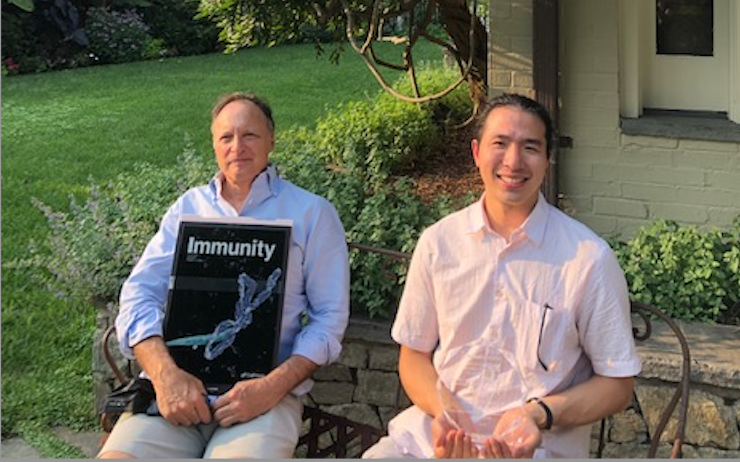First awarded in 2016, the International Biomedical Research Alliance’s Innovation Award recognizes novel solutions in biology or medicine and acknowledges discoveries of unusual importance, application, or magnitude that make use of new or unusual methods, paradigms, or approaches to solve important problems in biology or medicine. Again in 2021, the Innovation Award was generously sponsored by BioHealth Innovation Inc. For the first time, this award was presented, ex aequo, to Olive Jung and Lawrence Wang for their individual accomplishments.
Lawrence Wang isolated an antibody (L9) against a malaria protein that defined a novel site of neutralization on the dominant protein covering the infectious sporozoite. This work, published in Immunity also provides a detailed mechanism for this and other human monoclonal antibodies mediated protection in vivo. He also showed that this is currently the most potent malaria monoclonal antibody in the literature. Based on these data, the Vaccine Research Center has initiated a clinical development program of the L9 monoclonal antibody and it will be tested in humans for protection in 2021.
Following the demonstration that L9 is safe and effective in the Phase 1 trial, studies are planned next year in Africa in 1–10-year-olds. The Gates Foundation has made L9 its top priority as a potentially new intervention for the prevention of malaria. Overall, Lawrence’s outstanding scientific work in terms of discovery and mechanism has been quickly translated into clinical application. Lawrence will also be submitting two additional manuscripts this year on his current work and has exciting data on some new antibodies to other stages of malaria infection.
“I was deeply honored to learn that I had won the 2021 Innovation Award for my discovery of a highly potent antimalarial monoclonal antibody called L9. I had the good fortune of isolating this antibody approximately two months after I started graduate school in August 2018 during a practice run of our lab’s antibody isolation protocol. Subsequently, I was swept away in an exhilarating tidal wave of scientific investigation and found myself collaborating with other people in my lab at the NIH Vaccine Research Center (VRC) and around the world. Working in tandem with this team of highly skilled scientists, we showed that L9 was more potent than all previously published monoclonal antibodies at preventing malaria in mice exposed to infected mosquitos and that this antibody-targeted a new site of vulnerability on malaria parasites. This data was published in a Report in the October 2020 issue of Immunity, with an image of a malaria parasite being destroyed by L9 featured as the cover of the October 2020 issue. Given its high potency in mice, the VRC decided to develop L9 for a clinical trial which commenced in September 2021. In fact, the first volunteer was infused with L9 in mid-September, approximately three years after I first cloned the sequence of this antibody in the lab. None of this would have been possible without the vision and guidance of my PI, Dr. Bob Seder, as well as the collective efforts of everyone who worked on the L9 project at the NIH and around the world. I am extremely grateful for the opportunity of working alongside such a dedicated group of people to translate this antibody-based malaria drug into the clinic and hope that L9 will one day significantly contribute towards eradicating malaria for good,” remarked Lawrence.
Upon graduation, both Lawrence will return to medical school to pursue his journey as a physician-scientist. We wish Lawrence much success in his future and look forward to reading about his achievements.

